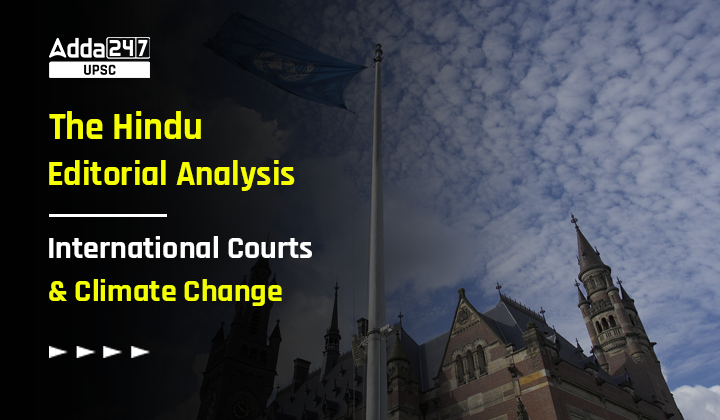Table of Contents
The Hindu Editorial Analysis: International Courts And Climate Change
In Today’s The Hindu Editorial Analysis, ”International Courts And Climate Change”, We Will Discuss: Legal Instruments, ICJ’s Jurisdiction On Climate Change, Legal Questions To The ICJ, What Is ITLOS?, etc.
Context
In News
- A group of 16 countries has launched a gallant effort to fight the problem of climate change — an existential threat to human civilisation — at the United Nations (UN).
- Led by Vanuatu — an island country in the South Pacific Ocean — the group seeks an advisory opinion from the International Court of Justice (ICJ) on the issue of climate change.
Background
- Small Island Developing (SID) states such as Vanuatu are most vulnerable to rising temperatures and sea levels.
- Accordingly, in September 2021, Vanuatu launched an initiative, through the UNGA, to seek an advisory opinion from the ICJ to “clarify the legal obligations of all countries to prevent and redress the adverse effects of climate change”.
- Since then, the initiative has gathered momentum with reportedly more than 100 countries backing the idea.
Have Legal Instruments Failed To Resolve Climate Change?
- Notwithstanding the presence of several international legal instruments on climate change such as the United Nations Framework Convention on Climate Change, the Kyoto Protocol and the Paris Agreement, the international community has fallen short of delivering concrete solutions to the problem of climate change.
- The recently concluded 27th UN Climate Change Conference (COP-27) where countries failed to narrow their differences on critical issues such as reducing greenhouse gas emissions perfectly exemplifies the failure of the international community to get its act together on the issue of climate change.
- At COP-27, while it was agreed to establish a “loss and damage” fund to financially assist vulnerable developing countries, there is little clarity on which countries will provide the funding. Moreover, the connection between funding and the historical responsibility of developed countries in emissions is yet to be determined.
ICJ’s Jurisdiction On Climate Change
- The ICJ has two types of jurisdictions: contentious and advisory.
- While contentious jurisdiction refers to resolving legal disputes between consenting states
- Under advisory jurisdiction, the UN General Assembly (UNGA), the Security Council (SC) and other specialised bodies of the organisation can request the ICJ for an opinion on a legal question.
- Unlike decisions given under the contentious jurisdiction, the ICJ’s advisory opinions are non-binding. Yet, they carry normative weight and clarify international law on a relevant issue.
- The ICJ’s advisory opinion on climate change will also be handy in climate-related litigation at the national level.
Legal Questions To The ICJ
The draft resolution piloted by Vanuatu seeks answers to the following questions from the ICJ.
- First, what are the international law obligations of countries toward the protection of the climate system from anthropogenic emissions of greenhouse gases for the present and future generations?
- What are the legal consequences for states that have caused significant harm to the climate system, the SID states and other people of the present and future generations? This question seeks to determine the price that states should pay for not honouring their international legal obligations on climate change.
What Is ITLOS?
- Established by the UNCLOS, the International Tribunal for the Law of the Sea(ITLOS) is an independent judicial body that adjudicates disputes arising out of the convention (UNCLOS).
- It is not just the ICJ whose advisory opinion is being sought. The Commission of Small Island States on Climate Change and International Law, comprising countries like Antigua and Barbuda and Tuvalu, has sought the advisory opinion of the Hamburg-based International Tribunal for the Law of the Sea (ITLOS).
- ITLOS has been requested to determine the specific obligations of the countries under the United Nations Convention on the Law of the Sea about preventing, controlling, and reducing pollution of the marine environment.
- The challenges of ocean warming, sea level rise and ocean acidification are all linked to the marine environment.
What Next?
- As part of a multi-pronged approach to saving our planet, one should welcome the role of international courts.
- Developed countries and groupings like the G-20 should support these laudable initiatives of the SID states.
- Environment and climate sustainability are important themes of G-20.
- India, as the president of the G-20, should take a lead given its relentless emphasis on LiFE (developing environment-friendly lifestyle) campaign.



 TSPSC Group 1 Question Paper 2024, Downl...
TSPSC Group 1 Question Paper 2024, Downl...
 TSPSC Group 1 Answer key 2024 Out, Downl...
TSPSC Group 1 Answer key 2024 Out, Downl...
 UPSC Prelims 2024 Question Paper, Downlo...
UPSC Prelims 2024 Question Paper, Downlo...





